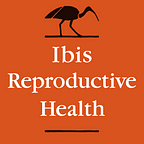Our commitment to principled partnerships and research that shifts power
By Kelly Blanchard
Happy new year and happy new decade to all. One of the key things that happened at Ibis at the end of the last decade was an important change to our mission statement. We added a very clear acknowledgment of how critical partnerships are to achieving our goals. Our new mission statement is:
Ibis Reproductive Health drives change through bold, rigorous research and principled partnerships that advance sexual and reproductive autonomy, choices, and health worldwide.
This change came out of an in-depth, participatory strategic planning process in 2017–2018. As we looked back over our 16 years of accomplishments and what had enabled us to be successful it was very clear that not only did virtually every project at Ibis involve at least one partner, but that those partnerships were critical to asking the right research questions, implementing research in a way that shifts power to the communities and individuals we seek to serve, and ensuring the research findings got into the hands of those who could make change. This focus on partnerships also reflects our commitment to justice and equity at Ibis — both in our workplace policies and culture and in the way we do research and advocate for policy and service delivery changes. There is no doubt that in the next decade our commitment to and skills at building and maintaining principled partnerships will be critical.
We are grateful to the amazing Ibis staff, Board members, and collaborators who were part of the Justice in Our Work team that developed a statement of principles, including Sruthi Chandrasekaran, Caitlin Gerdts, Anu Gómez, Ruvani Jayaweera, Brianna Keefe-Oates, Maureen Mtimkulu, Miriam Yeung, and Carmela Zuniga. This group also put together a guide with a set of questions to help staff and partners assess at all stages of a collaboration, whether we are putting our commitment to principled partnership into practice. Some of you have seen us present on this at conferences over the last year — many thanks to those of you who participated in those discussions and gave us feedback. We are very pleased to make our statement of principles and guide for implementing a human rights and reproductive justice approach to research and partnerships available to our colleagues, partners, and the general public. We see these as living documents and hope you will use them in your work. We look forward to hearing what you think about these resources, continuing our learning with our partners, and updating these resources in the future. We hope colleagues will use or adapt these documents — we ask that you acknowledge the source and please send your feedback on the content, how you used them, what you changed, and whether you found them helpful in your work.
As we enter a new year and a new decade there is much to be concerned about. There were many stories at the end of 2019 about the mess the world is in. It is true that all over the world we are more politically polarized than ever; economic growth and technological progress are increasingly benefiting only the wealthiest and most privileged, and we are struggling to find ways to keep up with the ever-increasing pace of communication and the ways smartphones are taking over every aspect of our lives. But there is also much progress to celebrate. Your smartphone can bring you comprehensive information about sexual and reproductive health in an app built with a focus on user preferences and needs. Two US states that did not include abortion care in their Medicaid (public insurance) plans will start the new decade including that coverage for people with low incomes who get their insurance through Medicaid, and we are closer than ever to an over-the-counter birth control pill in the United States. Around the world, access to safe and effective medication abortion is giving people the ability to exercise their right to build the families they choose, and grassroots feminist activist groups are showing how we can innovate abortion care and health care more generally so it centers people and their needs (see here, here, here, and here).
We look forward to continued progress and to working with our partners to further the critical work to improve reproductive health, rights, and justice around the world. We hope that our resources on principled partnerships and how we aim to make our commitment to our partners a reality are helpful both to colleagues we work with directly as well as the broader field and allied social justice organizations. We believe it is together and in authentic partnership with advocates, activists, providers, and policymakers that research will make a difference. Thank you for your partnership and here’s to continued progress this year and in the coming decade.
-Kelly Blanchard
President, Ibis Reproductive Health
